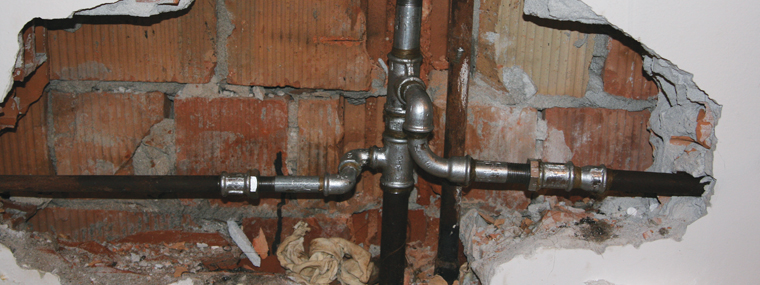
Under The Surface
Water Leaks and Pipe Bursts
By Michael Gelfand, Esq. / Published October 2018

Several months into hurricane season, there is cause to review insurance coverage and, just as important, procedures for making claims. This edition focuses upon these concerns, reciting two Florida appellate decisions that may apply and explaining two areas that Florida policyholders, including associations, are increasingly impacted by: timing of claim notices and assignments of policy benefits.
Water, Water, Everywhere: Adding Money Damage To Physical Injury—Timely Reporting Requirements
You see it, at first nudging under the home’s front door, then flowing as a river. Or, the drip overhead becomes drip-drip-drip, and then a steady stream. Water in the wrong place? Pick your scenario, but either scenario is always fearful for associations. What to do first? Call a plumber to fix the source? Then what? Pack up? Go home? Not so fast!
The lesson of what happens when you just move on was under the surface in a recent Florida appellate court ruling barring insurance benefits because the complete water damage claim was not provided in a timely manner to the insurer. The facts in De La Rosa v. Florida Peninsula Insurance Company, 43 Fla. L. Weekly D 1116 (Fla. 4th DCA, May 16, 2018), indicated that in April 2014, the insured homeowner discovered that water was backing up in his master bathroom shower, seeping into the bathroom floor, and penetrating under the tile. The homeowner’s insurance policy required timely reporting of claims. In response to the homeowner’s initial claim, the insurer hired a plumbing company which replaced the drainage system for the home’s septic tank.
Ten months later, the homeowner renovated his master bathroom due to the damage caused by the water leak. Those renovations cost $4,000. In July 2015, the homeowner submitted a claim to his insurer in the amount of $22,274, including further losses. The insurer denied the claim.
Thereafter, the homeowner sued the insurer. The insurance company defended against the lawsuit, asserting that the homeowner failed to timely report the claim which “prejudiced” the insurer, meaning that the failure to report in a timely manner deprived the insurer of a fair ability to investigate and evaluate the claim. An adjuster for the insurer who inspected the plumbing after the claim was filed stated that because of the renovations to the bathroom, he could not observe any water damage resulting from the drainage. The trial court granted summary judgment for the insurer.
The Florida appellate court agreed with the decision of the trial court. The appellate court explained that the insurer was prejudiced by the homeowner’s delay in notifying the insurer because the insurer was not able to determine the damage at the time of the water backup. The appellate court stated, “the insurer would be prejudiced by the passage of time in investigating the extent of the loss, and thus, the cost of repair.”
The “moral of this story” is that you should consider immediately notifying your insurer as soon as you discover damage to your property caused by an insurable event, such as a water leak or wind damage. In condominiums, this need to quickly report is frequently extended to include parts of a unit insured by the association. Bottom Line: The longer your delay, the less likely your claim will be paid.
Assignment of Insurance Benefits to Obtain Immediate Help When A Pipe Bursts
Discovering water damage is just the first step in what can be a long and difficult travail. The daunting task of cleaning up the mess is next. But who pays?
Unfortunately, frequently Florida homeowners do not have casualty or liability coverage. They may believe they lack the funds to pay for clean-up. Especially in Florida, quick clean-up is necessary to prevent further damage, either from the water itself or from “bad mold.”
With increasing frequency, homeowners and associations assign their insurance benefits in exchange for what is hoped will be quick clean-up service. Just like endorsing a check, in an assignment the servicing company seeks to obtain future insurance payments in return for the company completing the clean-up. One benefit for homeowners and associations is that usually the haggling with the insurer is by the clean-up company, saving the homeowner and the association time and money!
The ability of a clean-up company to collect, and thus the likelihood of the company to accept an assignment and do the work, may depend on contract wording. In a case involving a burst pipe and water damage, a Florida appellate court ruled that a homeowner’s assignment of insurance benefits to a company that provided additional remediation was not invalidated by an earlier assignment of benefits to the company that removed the water and debris. In Nicon Construction, Inc. v. Homeowners Choice Property and Casualty insurance Company, 43 Fla. L. Weekly D 1076 (Fla. 2nd DCA, May 11, 2018), the facts show that after a pipe burst in April 2012, the homeowner hired B&M Clean to remove the water and debris and also hired Nicon Construction for asbestos remediation.
In exchange for emergency services, the homeowner provided an assignment of benefits from his insurance policy to both firms. The first assignment to B&M Clean stated that the homeowner was assigning “any and all insurance rights, benefits, and causes of action under my property insurance policy” to B&M Clean. After the insurer failed to pay all of the benefits due under the policy, both companies sued the insurer for breach of contract. The trial court granted summary judgment for the insurer against the second company, Nicon, finding that the assignment to Nicon was invalid because at the time the insurer assigned his benefits to Nicon, he had first assigned all benefits for the loss to B&M Clean.
The Florida appellate court disagreed and found that the assignment to Nicon was valid. In reversing the trial court decision, the appellate court stated:
When the phrase “any and all insurance rights, benefits, and causes of action under my property insurance policy” is read in the context of the entire assignment and the purpose for which it was entered into, it is evident that [the homeowner] was assigning all his rights under the policy to payment for the services performed by B&M Clean—not all his rights to payment for the entire covered claim.
This case exemplifies the pitfalls when assigning insurance benefits if the assignment is too broad.
It is important to read and understand the related documents identifying who has the duty to do what, including when money must be paid and what triggers payment for how much. As part of the process, clearly understanding your insurance policies, the contract for clean-up, and the assignment are necessary. Failing to ask questions up front may mean greater liability for payment later.
Michael J. Gelfand, Esq.
Senior Partner of Gelfand & Arpe, P.A.
Michael J. Gelfand, Esq., the Senior Partner of Gelfand & Arpe, P.A., emphasizes a community association law practice, counseling associations and owners how to set legitimate goals and effectively achieve those goals. Gelfand is a Florida Bar Board-Certified Real Estate Lawyer, Certified Circuit and County Civil Court Mediator, Homeowners Association Mediator, an Arbitrator, and Parliamentarian. He is a past Chair of the Real Property Division of the Florida Bar’s Real Property, Probate & Trust Law Section, and a Fellow of the American College of Real Estate Lawyers. Contact him at ga@gelfandarpe.com or (561) 655-6224.




